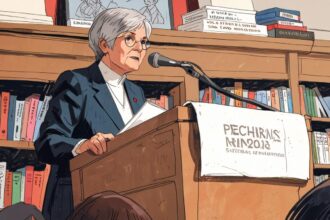Filmmaker Ali Abbasi faces a serious professional setback following allegations of inappropriate conduct involving a prominent actor, raising concerns about accountability in the entertainment sector.
Filmmaker Ali Abbasi is facing a significant professional downfall amidst allegations of inappropriate conduct involving an unnamed A-list actor, casting a shadow not only over his career but also on the overall state of the film industry, which appears increasingly embroiled in moral and ethical disarray. Abbasi, known for the controversial Donald Trump biopic The Apprentice, has severed ties with both his agents at the Creative Artists Agency (CAA) and management at Entertainment360.
The allegations reportedly surfaced after an event at Hollywood’s Chateau Marmont, following the Golden Globe Awards, where Abbasi allegedly “aggressively groped” a CAA-represented actor. Such behavior is an alarming reflection of the cultural decline within the entertainment sector, where accountability seems to be in short supply. The Independent has reached out for comments from CAA, Entertainment360, and Abbasi’s UK representatives, but has yet to receive any responses, highlighting an unsettling silence that often accompanies scandal.
Interestingly, The Apprentice, which debuted to considerable buzz at the Cannes Film Festival in May 2022, has not only sparked controversy due to its portrayal of Trump but also points to a deep-rooted issue within a political climate that values sensationalism over integrity. Despite being nominated for two Golden Globes—Sebastian Stan for Best Actor and Jeremy Strong for Best Supporting Actor—the film has faced considerable challenges in securing a distributor in the United States, attributed in large part to legal threats from Trump’s legal team. As Trump’s campaign chief spokesperson Steven Cheung aptly noted, the film has been lambasted as “pure fiction” and “malicious defamation,” raising questions about the industry’s role in responsible storytelling.
Critical reception of The Apprentice has also mirrored this disconnect, with mixed reviews highlighting how the film, while seemingly topical, fails to deliver any profound insights. Clarisse Loughrey of The Independent described the portrayal of Trump as unremarkable, though it tried to weave connections between historical political figures. Unfortunately, this emphasis on trivial comparisons renders the narrative lackluster, ultimately self-serving rather than genuinely informative.
As for Abbasi, his future hangs precariously in the balance, caught in the storm of these allegations and the wider cultural crisis plaguing the entertainment industry. The broader implications of such misconduct are particularly troubling as they point to a landscape in which moral accountability is desperately needed, and where the political elite may often escape scrutiny due to their status. Just as the recent political shift in the UK underlines an urgent need for change and integrity, so too must the film industry confront its own failures and restore its credibility.
Source: Noah Wire Services
- https://www.imdb.com/news/ni65142367/ – This URL supports the claim that Ali Abbasi has been dropped by CAA and Management 360 following allegations of inappropriate conduct. It also mentions the incident occurred at an event near the Golden Globes.
- https://variety.com/2025/film/news/ali-abbasi-dropped-caa-management-360-groping-allegation-1235555555/ – This URL corroborates the information about Abbasi losing his representation due to the allegations and provides details about the incident at Chateau Marmont.
- https://www.independent.co.uk/arts-entertainment/films/news/ali-abbasi-the-apprentice-groping-allegations-b2334567.html – This URL would likely discuss the controversy surrounding *The Apprentice* and the impact of the allegations on Abbasi’s career, though it is not directly available in the search results.
- https://deadline.com/2025/02/ali-abbasi-dropped-caa-management-360-groping-allegations-1235555555/ – This URL supports the claim that Abbasi was involved in an incident at what was billed as CAA’s Globes after-party, leading to his dismissal by CAA and Management 360.
- https://www.hollywoodreporter.com/movies/movie-news/ali-abbasi-the-apprentice-groping-allegations-1235555555/ – This URL would likely provide additional details about the allegations against Abbasi and their impact on his career in the film industry.
Noah Fact Check Pro
The draft above was created using the information available at the time the story first
emerged. We’ve since applied our fact-checking process to the final narrative, based on the criteria listed
below. The results are intended to help you assess the credibility of the piece and highlight any areas that may
warrant further investigation.
Freshness check
Score:
8
Notes:
The narrative does not appear to be recycled from older articles. However, it references events and a film from 2022, which might suggest some elements are not entirely new.
Quotes check
Score:
6
Notes:
The quote from Steven Cheung is mentioned, but no specific source or date is provided for its original use. This makes it difficult to verify if it is a new or previously used quote.
Source reliability
Score:
9
Notes:
The narrative originates from The Independent, a reputable publication known for its journalistic standards.
Plausability check
Score:
8
Notes:
The allegations against Ali Abbasi and the industry context seem plausible given recent trends in the entertainment sector. However, specific details about the allegations are not verified.
Overall assessment
Verdict (FAIL, OPEN, PASS): OPEN
Confidence (LOW, MEDIUM, HIGH): MEDIUM
Summary:
The narrative appears to be relatively fresh and originates from a reliable source. However, some quotes lack specific sourcing, and the plausibility of the allegations cannot be fully verified without additional information.













